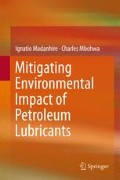Abstract
The present-day requirements for biodegradable and eco-friendly lubricants imply that lubricants have properties that can minimize, if not eliminate, negative environmental impact, such as contamination of soil and water, caused by lost lubrication, leakage and accidents. The dominant, factors that have a direct impact on the environment and which characterize the lubricant and its chemical composition, are toxicity, bio-accumulation and biodegradability. Bio-degradability is perhaps the most important factor which determines the fate of lubricant in the environment. Life cycle analysis (LCA) also helps in assessing the total environmental impact of lubricants. This chapter reviews the essential requirements of environmentally adapted lubricants, with regards to chemical composition, eco-toxicity, biodegradability, bio-accumulation, and eco-labeling schemes, and life cycle analysis.
Access this chapter
Tax calculation will be finalised at checkout
Purchases are for personal use only
References
Chauhan PS, Chhibber VK (2013) Non-edible oils as potential source for bio lubricant production and future prospects in India: a review. Indian J Appl Res Chem Vol 3(5)
EPA (2011) Environmentally acceptable lubricants, exhaust gas scrubber washwater effluent. United States Environmental Protection Agency, Office of Wastewater Management Washington (DC 20460)
Jain AK, Suhane A (2013) Mini review biotechnology: a way to control environmental pollution by alternative lubricants. Res Biotechnol 4(3):38–42. ISSN:2229-791X, http://www.researchinbiotechnology.com
Kreivaitis R, Padgurskas J, Spruogis B, Gumbyte M (2011) Investigation of environmentally friendly lubricants. In: The 8th international conference, May 19–20, 2011, environmental engineering (selected papers), Vilnius, Lithuania. http://enviro.vgtu.lt
Author information
Authors and Affiliations
Corresponding author
Rights and permissions
Copyright information
© 2016 Springer International Publishing Switzerland
About this chapter
Cite this chapter
Madanhire, I., Mbohwa, C. (2016). Environmentally Adapted Lubricants. In: Mitigating Environmental Impact of Petroleum Lubricants. Springer, Cham. https://doi.org/10.1007/978-3-319-31358-0_12
Download citation
DOI: https://doi.org/10.1007/978-3-319-31358-0_12
Published:
Publisher Name: Springer, Cham
Print ISBN: 978-3-319-31357-3
Online ISBN: 978-3-319-31358-0
eBook Packages: Chemistry and Materials ScienceChemistry and Material Science (R0)

